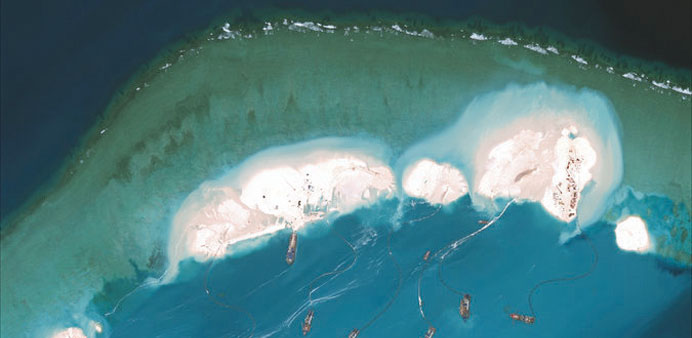Manila Times/Quezon City
There is a chance that China will stop its island-building spree in the West Philippine Sea (South China Sea) and other areas if all members of the Association of Southeast Asian Nations (Asean) and Japan agree to issue a united stand against Beijing’s sea activities, the Armed Forces of the Philippines (AFP) said.
“In this part of the region, a collective voice is much stronger than a few. The whole of Asia, Asean is a very strong voice. If [Asian nations] can [stay] together, much better,” colonel Restituto Padilla, AFP spokesman, said in a statement released yesterday.
Padilla added that China will likely listen if more countries will speak out against its dredging activities in a number of reefs that are also being claimed by the Philippines, Vietnam, Malaysia and Japan.
“Even if we are wrong, we are still right, that’s China’s mentality. If you will look at the history of China, that has been its attitude. It sees itself as the start of civilisation, the center of the world,” he pointed out.
The AFP spokesman noted that concerns voiced by various think thanks and the issues they present are the same issues that the Philippines has been raising all along.
“It only goes to show that what we have been saying is shared by many and that all nations ought to speak out as well so that hopefully, with that one voice, China will listen and not use might versus what is right and it may as well go by the rules-based approach that all peace-loving nations conform [with],” Padilla explained.
In a recent report, The New York Times said China’s land reclamation projects in disputed territories had created seven new islets in the region at an alarming speed.
“The announcement marks a change in diplomatic tone, and indicates that China has reached its scheduled completion on several land reclamation projects and is now moving into the construction phase,” the report said, quoting Mira Rapp-Hooper, director of the Asia Maritime Transparency Initiative at the Center for Strategic and International Studies.
It said China has built port facilities, military buildings and an airstrip on these islands.
Padilla said other countries are hesitant to speak out against China because they are protecting their interests, particularly on the economic front.
He, however, opined that China will not slap economic sanctions on these countries because Beijing is also dependent on trade.
“[Because China is also dependent on trade right? It needs other nations to be able to sell its goods. It is also dependent on the goods that are coming in [from other countries]. So it is just give and take. If it becomes a solitary economic unit, it will not prosper,” Padilla said
While the G7 or Group of 7 that is comprised of Canada, France, Germany, Italy, Japan, the United Kingdom and the United States have spoken against China’s unilateral actions such as large-scale reclamations in disputed waterways, the AFP spokesman also noted that the Asean had been silent on the issue.
“That is our challenge. Asean should have one solid voice,” the AFP official said.
Last month, the Philippines sent a delegation to The Hague to convince a United Nations-backed international tribunal to take jurisdiction of the complaint filed by Manila challenging China’s claim to almost the entire West Philippine Sea.
The Philippines and fellow Asean members Brunei Darussalam, Malaysia and Vietnam have competing claims to South China Sea areas along with China and Taiwan.
The dispute grew increasingly tense in recent years with the Philippines at the forefront of accusing China of “bullying” in asserting its claim to the South China Sea, a crucial lane and fishing ground also believed to hold vast mineral resources.
In recent months, the Philippines had raised the alarm over China’s land reclamation to turn outcroppings in the sea into artificial islands that can host military outposts.
Asean, which also includes Indonesia, Cambodia, Laos, Myanmar, Singapore and Thailand, has been pushing for the establishment of a “Code of Conduct” with China that would bind the rival claimants not to take actions that could spark conflict in the region.
Despite their appeal for unity, Asean members have diverging agendas, and the bloc has had difficulty taking a common stand on China, which has close relationships with several members.
Experts, however, said Asean should look at the bigger context of its ties with China and not be bogged down by the territorial disputes in the South China Sea.
“The territorial flashpoints in the South China Sea are not going away, but then again Asean-China relations have always been more than just the South China Sea,” Benjamin Ho, a maritime security researcher, said.
Ho, associate research fellow at the Institute of Defense and Strategic Studies, Nanyang Technological University of Singapore, said the Asean-China relations are largely very stable at the moment.
Ho said having a “Code of Conduct”or COC will certainly help clarify interests of the respective countries.

A satellite image shows an emerging artificial island at Mischief Reef. Right: A US Navy jet over the South China Sea. China says the flights violate
